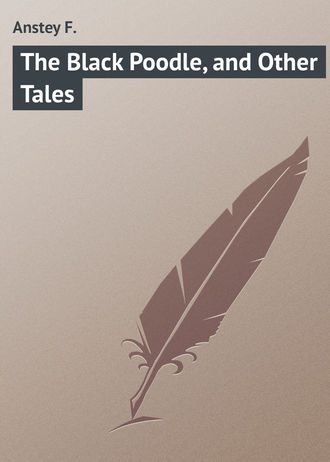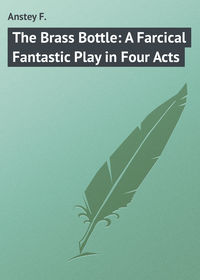 полная версия
полная версияThe Black Poodle, and Other Tales
I decided to call the Colonel at once, and attempt to brazen it out with the help of his sincere belief in the dog.
'Eh, what's that; what's it all about?' said the Colonel, bustling up, followed at intervals by the others.
The Frenchman raised his hat again. 'I do not vant to make a trouble,' he began, 'but zere is leetle mistake. My word of honour, sare, I see my own poodle in your garden. Ven I appeal to zis gentilman to restore 'im he reffer me to you.'
'You must allow me to know my own dog, sir,' said the Colonel. 'Why, I've had him from a pup. Bingo, old boy, you know your master, don't you?'
But the brute ignored him altogether, and began to leap wildly at the hedge, in frantic efforts to join the Frenchman. It needed no Solomon to decide his ownership!
'I tell you, you 'ave got ze wrong poodle – it is my own dog, my Azor! He remember me well, you see? I lose him it is three, four days… I see a nottice zat he is found, and ven I go to ze address zey tell me, "Oh, he is reclaim, he is gone wiz a strangaire who has advertise." Zey show me ze placard, I follow 'ere, and ven I arrive, I see my poodle in ze garden before me!'
'But look here,' said the Colonel, impatiently; 'it's all very well to say that, but how can you prove it? I give you my word that the dog belongs to me! You must prove your claim, eh, Travers?'
'Yes,' said Travers, judicially, 'mere assertion is no proof: it's oath against oath, at present.'
'Attend an instant – your poodle was he 'ighly train, had he some talents – a dog viz tricks, eh?'
'No, he's not,' said the Colonel; 'I don't like to see dogs taught to play the fool – there's none of that nonsense about him, sir!'
'Ah, remark him well, then. Azor, mon chou, danse donc un peu!'
And on the foreigner's whistling a lively air, that infernal poodle rose on his hind legs and danced solemnly about half-way round the garden! We inside followed his movements with dismay. 'Why, dash it all!' cried the disgusted Colonel, 'he's dancing along like a d – d mountebank! But it's my Bingo for all that!'
'You are not convince? You shall see more. Azor, ici! Pour Beesmarck, Azor!' (the poodle barked ferociously). 'Pour Gambetta!' (he wagged his tail and began to leap with joy). 'Meurs pour la Patrie!' – and the too-accomplished animal rolled over as if killed in battle!
'Where could Bingo have picked up so much French!' cried Lilian, incredulously.
'Or so much French history?' added that serpent Travers.
'Shall I command 'im to jomp, or reverse 'imself?' inquired the obliging Frenchman.
'We've seen that, thank you,' said the Colonel, gloomily. 'Upon my word, I don't know what to think. It can't be that that's not my Bingo after all – I'll never believe it!'
I tried a last desperate stroke. 'Will you come round to the front?' I said to the Frenchman; 'I'll let you in, and we can discuss the matter quietly.' Then, as we walked back together, I asked him eagerly what he would take to abandon his claims and let the Colonel think the poodle was his after all.
He was furious – he considered himself insulted; with great emotion he informed me that the dog was the pride of his life (it seems to be the mission of black poodles to serve as domestic comforts of this priceless kind!), that he would not part with him for twice his weight in gold.
'Figure,' he began, as we joined the others, 'zat zis gentilman 'ere 'as offer me money for ze dog! He agrees zat it is to me, you see? Ver well zen, zere is no more to be said!'
'Why, Weatherhead, have you lost faith too, then?' said the Colonel.
I saw that it was no good – all I wanted now was to get out of it creditably and get rid of the Frenchman. 'I'm sorry to say,' I replied, 'that I'm afraid I've been deceived by the extraordinary likeness. I don't think, on reflection, that that is Bingo!'
'What do you think, Travers?' asked the Colonel.
'Well, since you ask me,' said Travers, with quite unnecessary dryness, 'I never did think so.'
'Nor I,' said the Colonel; 'I thought from the first that was never my Bingo. Why, Bingo would make two of that beast!'
And Lilian and her aunt both protested that they had had their doubts from the first.
'Zen you pairmeet zat I remove 'im?' said the Frenchman.
'Certainly' said the Colonel; and after some apologies on our part for the mistake, he went off in triumph, with the detestable poodle frisking after him.
When he had gone the Colonel laid his hand kindly on my shoulder. 'Don't look so cut up about it, my boy,' he said; 'you did your best – there was a sort of likeness, to any one who didn't know Bingo as we did.'
Just then the Frenchman again appeared at the hedge. 'A thousand pardons,' he said, 'but I find zis upon my dog – it is not to me. Suffer me to restore it viz many compliments.'
It was Bingo's collar. Travers took it from his hand and brought it to us.
'This was on the dog when you stopped that fellow, didn't you say?' he asked me.
One more lie – and I was so-weary of falsehood! 'Y-yes,' I said reluctantly, that was so.'
'Very extraordinary,' said Travers; 'that's the wrong poodle beyond a doubt, but when he's found, he's wearing the right dog's collar! Now how do you account for that?'
'My good fellow,' I said impatiently, 'I'm not in the witness-box. I can't account for it. It – it's a mere coincidence!'
'But look here, my dear Weatherhead,' argued Travers (whether in good faith or not I never could quite make out), 'don't you see what a tremendously important link it is? Here's a dog who (as I understand the facts) had a silver collar, with his name engraved on it, round his neck at the time he was lost. Here's that identical collar turning up soon afterwards round the neck of a totally different dog! We must follow this up; we must get at the bottom of it somehow! With a clue like this, we're sure to find out, either the dog himself, or what's become of him! Just try to recollect exactly what happened, there's a good fellow. This is just the sort of thing I like!'
It was the sort of thing I did not enjoy at all. 'You must excuse me to-night, Travers,' I said uncomfortably; 'you see, just now it's rather a sore subject for me – and I'm not feeling very well!' I was grateful just then for a reassuring glance of pity and confidence from Lilian's sweet eyes which revived my drooping spirits for the moment.
'Yes, we'll go into it to-morrow, Travers,' said the Colonel; 'and then – hullo, why, there's that confounded Frenchman again!'
It was indeed; he came prancing back delicately, with a malicious enjoyment on his wrinkled face. 'Once more I return to apologise,' he said. 'My poodle 'as permit 'imself ze grave indiscretion to make a very big 'ole at ze bottom of ze garden!'
I assured him that it was of no consequence. 'Perhaps,' he replied, looking steadily at me through his keen half-shut eyes, 'you vill not say zat ven you regard ze 'ole. And you others, I spik to you: somtimes von loses a somzing vich is qvite near all ze time. It is ver droll, eh? my vord, ha, ha, ha!' And he ambled off, with an aggressively fiendish laugh that chilled my blood.
'What the dooce did he mean by that, eh?' said the Colonel, blankly.
'Don't know,' said Travers; 'suppose we go and inspect the hole?'
But before that I had contrived to draw near it myself, in deadly fear lest the Frenchman's last words had contained some innuendo which I had not understood.
It was light enough still for me to see something, at the unexpected horror of which I very nearly fainted.
That thrice accursed poodle which I had been insane enough to attempt to foist upon the Colonel must, it seems, have buried his supper the night before very near the spot in which I had laid Bingo, and in his attempts to exhume his bone had brought the remains of my victim to the surface!
There the corpse lay, on the very top of the excavations. Time had not, of course, improved its appearance, which was ghastly in the extreme, but still plainly recognisable by the eye of affection.
'It's a very ordinary hole,' I gasped, putting myself before it and trying to turn them back. 'Nothing in it – nothing at all!'
'Except one Algernon Weatherhead, Esq., eh?' whispered Travers jocosely in my ear.
'No, but,' persisted the Colonel, advancing, 'look here! Has the dog damaged any of your shrubs?'
'No, no!' I cried piteously, 'quite the reverse. Let's all go indoors now; it's getting so cold!'
'See, there is a shrub or something uprooted!' said the Colonel, still coming nearer that fatal hole. 'Why, hullo, look there! What's that?'
Lilian, who was by his side, gave a slight scream. 'Uncle,' she cried, 'it looks like – like Bingo!'
The Colonel turned suddenly upon me. 'Do you hear?' he demanded, in a choked voice. 'You hear what she says? Can't you speak out? Is that our Bingo?'
I gave it up at last; I only longed to be allowed to crawl away under something! 'Yes,' I said in a dull whisper, as I sat down heavily on a garden seat, 'yes … that's Bingo … misfortune … shoot him … quite an accident!'
There was a terrible explosion after that; they saw at last how I had deceived them, and put the very worst construction upon everything. Even now I writhe impotently at times, and my cheeks smart and tingle with humiliation, as I recall that scene – the Colonel's very plain speaking, Lilian's passionate reproaches and contempt, and her aunt's speechless prostration of disappointment.
I made no attempt to defend myself; I was not perhaps the complete villain they deemed me, but I felt dully that no doubt it all served me perfectly right.
Still I do not think I am under any obligation to put their remarks down in black and white here.
Travers had vanished at the first opportunity – whether out of delicacy, or the fear of breaking out into unseasonable mirth, I cannot say; and shortly afterwards the others came to where I sat silent with bowed head, and bade me a stern and final farewell.
And then, as the last gleam of Lilian's white dress vanished down the garden path, I laid my head down on the table amongst the coffee-cups and cried like a beaten child.
I got leave as soon as I could and went abroad. The morning after my return I noticed, while shaving, that there was a small square marble tablet placed against the wall of the Colonel's garden. I got my opera-glass and read – and pleasant reading it was – the following inscription: —
IN AFFECTIONATE MEMORYOFB I N G O,SECRETLY AND CRUELLY PUT TO DEATH,IN COLD BLOOD;BY ANEIGHBOUR AND FRIENDJUNE, 1881If this explanation of mine ever reaches my neighbours' eyes, I humbly hope they will have the humanity either to take away or tone down that tablet. They cannot conceive what I suffer, when curious visitors insist, as they do every day, in spelling out the words from our windows, and asking me countless questions about them!
Sometimes I meet the Curries about the village, and, as they pass me with averted heads, I feel myself growing crimson. Travers is almost always with Lilian now. He has given her a dog – a fox-terrier – and they take ostentatiously elaborate precautions to keep it out of my garden.
I should like to assure them here that they need not be under any alarm. I have shot one dog.
THE STORY OF A SUGAR PRINCE
A TALE FOR CHILDRENOf course he may have been really a fairy prince, and I should be sorry to contradict any one who chose to say so. For he was only about three inches high, he had rose-pink cheeks and bright yellow curling locks, he wore a doublet and hose which fitted him perfectly, and a little cap and feather, all of delicately contrasted shades of blue – and this does seem a fair description of a fairy prince.
But then he was painted – very cleverly – but still only painted, on a slab of prepared sugar, and his back was a plain white blank; while the regular fairies all have more than one side to them, and I am obliged to say that I never before happened to come across a real fairy prince who was nothing but paint and sugar.
For all that he may, as I said before, have been a fairy prince, and whether he was or not does not matter in the least – for he at any rate quite believed he was one.
As yet there had been very little romance or enchantment in his life, which, as far as he could remember, had all been spent in a long shop, full of sweet and subtle scents, where the walls were lined with looking-glass and fitted with shelves on which stood rows of glass jars, containing pastilles and jujubes of every colour, shape, and flavour in the world – a shop where, in summer, a strange machine for making cooling drinks gurgled and sputtered all day long, and in winter, the large plate-glass windows were filled with boxes made of painted silk from Paris, so charmingly expensive and useless that rich people bought them eagerly to give to one another.
The prince generally lay on one of the counters between two beds of sugar roses and violets in a glass case, on either side of which stood a figure of highly coloured plaster.
One was a major of some unknown regiment; he had an immense head, with goggling eyes and a very red complexion, and this head would unscrew so that he could be filled with comfits, which, though it hurt him fearfully every time this was done, he was proud of, because it always astonished people.
The other figure was an old brown gipsy woman in a red cloak and a striped petticoat, with a head which, although it wouldn't take off, was always nodding and grinning mysteriously from morning to night.
It was to her that the prince (for we shall have to call him 'the prince,' as I don't know his other name – if he ever had one) owed all his notions of Fairyland and his high birth.
'You let the old gipsy alone for knowing a prince when she sees one,' she would say, nodding at him with encouragement. 'They've kept you out of your rights all this time; but wait a while, and see if one of these clumsy giants that are always bustling in and out doesn't help you; you'll be restored to your kingdom, never fear!'
But the major used to get angry at her prophecies: 'It's all nonsense,' he used to say, 'the boy's no more a prince than I am, and he'll never be noticed by anybody, unless he learns to unscrew his head and hold comfits – like a soldier and a gentleman!'
However, the prince believed the gipsy, and every morning, as the shutters were taken down, and grey mist, brilliant sunshine, or brown fog stole into the close shop, he wondered whether the day had come which would see his restoration to his kingdom.
And at last the day really came; some one who had been buying sugar violets and roses noticed the prince in the middle of them and bought him too, to his immense delight. 'What did the old gipsy tell you, eh?' said the old woman, wagging her head wisely; 'you see, it has all come true!'
Even the major was convinced now, for, before the prince had been packed up, he whispered to him that if at any time he wanted a commander-in-chief, why, he knew where to send for him. 'Yes, I will remember,' said the prince; 'and you,' he added to the gipsy, 'you shall be my prime minister!' – for he was so ignorant of politics that he actually thought an old woman could be prime minister.
And then, before he could finish saying good-bye and hearing their congratulations, he was covered with several wrappers of white paper and plunged into complete darkness, which he did not mind at all, he was so happy.
After that he remembered no more until he was unwrapped and placed upright on the top of a dazzling white dome which stood in the very centre of a long plain, where a host of the strangest forms were scattered about in bewildering confusion.
On each side of him tall twisted trunks of sparkling glass and silver sprang high into the air, and from their tops the cool green branches swayed gently down, while round their bases velvet-petalled flowers bloomed in a bed of soft moss.
Farther away, an exquisite temple, made of a sort of delicate gold-coloured crystal, rose out of the crowd of gorgeous things that surrounded it, and this crowd, as the prince's eyes became accustomed to the splendour, gradually separated itself into various forms of loveliness.
He saw high curiously moulded masses of transparent amber, within which ruby and emerald gems glowed dimly; mounds of rose-flushed snow, and blocks of creamy marble; and in the space between these were huge platforms of silver and porcelain, on which were piled heaps of treasures that he knew must be priceless, though he could not guess what they were all used for.
But amidst all these were certain grim shapes; some seemed to be the carcases of fearful beasts, whose heads had all been struck off, but who had evidently shown such courage in death that they had earned the respect of the brave hunters who had vanquished them – for rosettes had been pinned on their rough breasts, and their stiffened limbs were bound together by bright-hued ribbons.
Then there was one monstrous head of some brute larger still, which could not have been quite killed even then, for its tawny eyes were still glaring with fury – the prince could easily have stood upright between its grinning jaws if he had wanted to do so; but he had no intention of doing any such thing, for though he was quite as brave as most fairy princes he was not foolhardy.
And there were big enchanted castles with no doors nor windows in them, and inhabited by restless monsters – dragons most likely – who had thrust their scaly black claws through the roofs.
Perhaps he was a little frightened by some of the ugliest shapes at first, but he soon grew used to them, and had no room for any other feelings than pride and joy. For this was Fairyland at last, stranger and more beautiful than anything he could have dreamed of – he had come into his kingdom!
He was going to live in that lacework palace; those dragons would come fawning out of their lairs presently, and do homage to him; these formidable dead creatures had been slain to do him honour; and he was the rightful owner of all these treasures of gold, and silk, and gems.
He must not forget, he thought, that he owed it all to the good-natured giants who had brought him here: no, when they came in – as of course they would – to pay their respects, he would thank them graciously and reward them liberally out of his new wealth.
There was a silver giraffe, stiff and old-fashioned, under a palm-tree hard by, which must have guessed from the prince's proud gay smile that he was deceiving himself and had no idea of his real position.
But the giraffe did not make any attempt to warn him, either because it had seen so many things all round it consumed in its day that the selfish fear that it too would be cut up and handed round some evening kept it preoccupied and silent, or else because, being only electro-plated and hollow inside, it had no feelings of any kind.
By-and-by the doors opened, and delicious bursts of music floated into the room, mingled with scraps of conversation and ripples of fresh laughter; servants came noiselessly in and increased the glare of a kind of sun that hung above the plain, and a host of smaller lights suddenly started up and shone softly through shades of silk and paper.
The music stopped, the laughter and voices grew louder and came nearer, there was the sound of approaching feet – and then a whole army of mortals surrounded the prince's kingdom.
They were a far smaller and finer race than the giants he had seen hitherto, with pretty fresh complexions, and wearing, some of them, soft shimmering dresses that he thought only fairies ever wore. After a little confusion, they ranged themselves in one long line completely round the plain; the taller beings glided softly about behind, and the prince prepared himself to receive their congratulations with proper dignity and modesty.
But these giants certainly had very odd ways of showing their loyalty, for they saluted him with a clinking and clattering so deafening that they would have drowned the noise of a million gnomes forging fairy armour, while every now and then came a loud report, after which a golden sparkling cascade fell creaming and bubbling from somewhere above into the crystal reservoirs prepared for it.
It was all very gratifying, no doubt – and yet, though they all pretended to be honouring him, no one seemed to pay him any more particular attention; he thought perhaps they might be feeling abashed in his presence, and that he must manage to reassure them.
But while he was thinking how he could best do this, he began to be aware that along the whole of that glittering plain things were being done without his permission which were scandalous and insulting – he saw the grisly carcases cut swiftly into pieces with flashing blades, or torn limb from limb deliberately; all the dragons were attacked and overpowered, and hauled out unresisting from their strongholds; even the fierce head was gashed hideously behind the ears!
He tried to speak and ask them what they meant by such audacity, but he could not make them hear as he could the major and the old gipsy; so he was obliged to look on while one by one the trophies dedicated to his glory were changed to shapeless heaps of ruin.
And, unless he was mistaken, the greater part of them were actually disappearing from sight altogether! It seemed impossible, for where could they all go to? and yet nothing now remained of the huge carcases but a meagre framework of bone, hanging together by shreds of skin; the strong castles were roofless walls with gaping breaches in them; and could it be that the more attractive objects were beginning to melt away in the same mysterious manner? Was it enchantment, or how – how on earth did they manage to do it?
He was no happier when he found out – for though, of course, to us eating is quite an ordinary everyday affair, only think what a shock the first sight of it must have been to a delicate fairy prince, whose mouth was simply a cherry-coloured curve, and not made to open on any terms!
He saw all the treasures he had looked upon as his very own being lifted to a long line of mouths of all sizes and shapes; the mouths opened to various widths, and – the treasures vanished, he could not tell how or where.
The mellow amber tottered and quivered for a while and was gone; even the solid creamy marble was hacked in pieces and absorbed; nothing, however beautiful or fantastic, escaped instant annihilation between those terrible bars of scarlet and flashing ivory.
Could this be Fairyland, this plain where all things beautiful were doomed – or had they brought him back to his kingdom only to make this cruel fun of him, and destroy his riches one by one before his eyes?
But before he could find any answers to these sad questions he chanced to look straight in front of him, and there he saw a face which made his little sugar heart almost melt within him, with a curious feeling, half pleasure, half pain, that was quite new to him.
It was a girl's face, of course, and the prince had not looked at her very long before he forgot all about his kingdom.
He was relieved to see that she at least was too generous to join in the work of destruction that was going on all around her – indeed, she seemed to dislike it as much as he did himself, for only a little of the tinted snow passed her soft lips.
Now and then she laughed a little silvery laugh, and shook out her rippling gold-brown hair at something the being next to her said – a great boy-mortal, with a red face, bold eyes, and grasping brown hands, which were fatal to everything within their range.
How the prince did hate that boy! – he found to his joy that he could understand what they said, and began to listen jealously to their conversation.
'I say,' the boy (whose name, it seemed, was Bertie) was saying, as he received a plateful of floating fragments of the lacework palace, 'you aren't eating anything, Mabel. Don't you care about suppers? I do.'
'I'm not hungry,' she said, evidently feeling this a distinction; 'I've been out so much this fortnight.'
'How jolly!' he observed, 'I only wish I had. But I say,' he added confidentially, 'won't they make you take a grey powder soon? They would me.'









